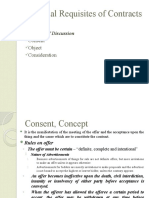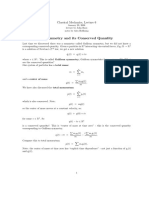Law On Contracts
Law On Contracts
Uploaded by
Rizza OlanoCopyright:
Available Formats
Law On Contracts
Law On Contracts
Uploaded by
Rizza OlanoOriginal Title
Copyright
Available Formats
Share this document
Did you find this document useful?
Is this content inappropriate?
Copyright:
Available Formats
Law On Contracts
Law On Contracts
Uploaded by
Rizza OlanoCopyright:
Available Formats
CONTRACTS
General provisions
CONTRACTS, concept:
A contract is a meeting of the minds between two persons whereby one binds himself, with respect to the
other, to give something or to render some service.
Persons- “parties”
• Natural person
• Juridical person- such as Corporation and Partnerships
Elements:
1. Essential Elements – those without which there will be no contract
1. Consent of the contracting parties
2. Object certain which is the subject matter of the contract
3. Cause of the obligation which must be established.
2. Natural Elements – those found in certain contracts and are presumed to exist, unless set aside or supressed by
the parties
1. Warranty against eviction
2. Warranty against hidden defects
3. Accidental Elements – those that refer to particular stipulations that maybe agreed upon by the parties.
1. Terms of payment
2. Place of payment
3. interest rate
etc…..
Classification of contracts
1. Classification of Contracts according to perfection or form:
1. CONSENSUAL (perfected by mere consent); Ex. Contract of Sale
2. REAL (perfected by delivery); Ex. Deposit and pledge.
3. FORMAL OR SOLEMN (those where special formalities are essential before the contract may be
perfected).
Ex. A simple donation inter vivos of real property, to be valid and perfected, must be in a public
instrument.
2. According to cause
1. Onerous – Those where there is an exchange of valuable considerations (ex. Sale, Lease or Barter)
2. Gratuitous or lucrative – Those where one party receives no equivalent consideration. (ex. Donation or
commodatum). These contracts are referred to as a contract of pure beneficence, the cause of which is the
liberality of the benefactor.
3. Remunerative or remuneratory- Those where one prestation is given for a benefit or service previously
rendered. The cause of these contracts is the service or benefit remunerated.
3. According to importance or dependence of one upon another
1. Principal – One that can stand independently by itself (such as sale, barter, lease and
load)
2. Accessory – One whose existence depends upon another contract (such as pledge,
and mortage which are dependent upon a principal contract such as loan)
3. Preparatory – One which serves as a means by which other contracts maybe entered
BUSINESS LAW 1 PAGE 1
CONTRACTS
into (such as agency and partnership)
4. According to name or designation
a. Nominate – Those that have a name under the law (such as sale, lease, barter and
partnership.)
b. Innominate – Those that do not have a special name under the law.
The 4 KINDS OF INNOMINATE CONTRACTS:
(a) Do ut Des – I give what you may give;
(b) Do ut Facias – I give what you may do;
(c) Facio ut Des – I do what you may give;
(d) Facio ut Facias – I do what you may do.
5. According to risk or fulfilment
a. Commutative – Those where the parties give equal or almost equal values ( such as sale and barter;
hence, there is real fulfilment
b. Aleatory – Those whose fulfilment depends upon chance; thus, the values given by the
parties vary because of the risks involved. (ex. Insurance contract
6. According to the parties obligated
a. Unilateral – Those where only one of the parties is obligated to give or to do something
( ex. Commodatum)
b. Bilateral or synalagmatic – those where both parties are required to give or to do
something (sale or barter). They may be reciprocal or non-reciprocal.
7. According to subject matter
a. Contracts involving things (such as sale and barter)
b. Contracts involving rights (such as usufruct and assignment of credits)
c. Contracts involving service (such agency and lease of service)
8. According to the time of fulfilment
a. Executed – One that has been performed.
b. Executory – One that has not been performed.
9. According to the number of persons physically entering into the contract
a. Ordinary- those where the parties are represented by different persons (sale and
barter)
b. Auto-contracts - Those where only one person represents the two opposite parties to
the contract (such as when the agent lends his money to the principal whom he
represents as borrower).
10. According to number of persons who participated in the drafting and preparation of the contract
a. Ordinary – one where both parties participated in the preparation of the contract
(deed of sale prepared by both parties)
b. Contract of adhesion – One where only one party prepared the contract ( ex.
Insurance contract)
STAGES OF A CONTRACT
BUSINESS LAW 1 PAGE 2
CONTRACTS
a. Preparation or Negotiation – here the parties are progressing with their negotiations; they have
not yet arrived at any definite agreement, although there may have been a preliminary offer, and
bargaining;
b. Perfection – Here the parties have at long last came to a definite agreement, the elements of definite
subject matter and valid cause have been accepted by mutual consent;
c. Consummation – here the terms of the contract are performed, and the contract may be said to have
been fully executed.
CHARACTERISTICS OF A CONTRACT
• 1. Contract has the obligatory force or character, or the principle that once a contract is perfected, it shall
be of obligatory force upon both of the contracting parties;
• 2. The autonomy of contracts, or the principle that the contracting parties are free to enter into a
contract and to establish stipulations, clauses, terms and conditions as they may deem convenient;
• 3. The mutuality of contracts, of the essential equality of the contracting parties whereby the contract
must bind both of them;
• 4. The relativity of contracts, or the principle that the contract takes effect only between the parties,
their assigns and heirs.
PRINCIPLES OF CONTRACTS
• PRINCIPLE OF LIBERALITY – or “freedom of contracts” or “autonomy of contracts”
Means the right of the parties to enter into such stipulations or terms and conditions in their contracts.
However, it is subject to certain limitations imposed by law and that the contracting parties may establish such
stipulations, clauses, terms and conditions as they may deem convenient, provided they are not contrary to law,
morals, good customs, public order or public policy.
Limitations on the Nature of Stipulations under a contract;
a. Law;
b. Morals;
c. Good Customs;
d. Public Order; or
e. Public Policy.
• PRINCIPLE OF RELATIVITY
A contract can only be binding to parties who had entered into it or their successors who assumed their
personalities or their juridical positions, and that, as a consequence, such contract can neither favor nor prejudice a
third person. (Quano vs. CA et. al., G.R. No. 95900, July 23, 1992)
Exceptions to the Principle of Relativity:
a. Where the obligations arising from the contract are not transmissible by their
nature, by stipulation or by provision of law;
b. Where there is a stipulation pour autrui (a stipulation in favor of a third party);
c. Where the third person induces another to violate his contract;
d. Where in some cases, third persons may be adversely affected by a contract
where they did not participate;
e. Where the law authorizes the creditor to sue on a contract entered into by his
debtor.
Requisites of a stipulation pour autrui :
BUSINESS LAW 1 PAGE 3
CONTRACTS
• a. There must be a stipulation in favor of a third person;
• b. The stipulation must be a part, not the whole of the contract;
• c. The contracting parties must have clearly and deliberately conferred a favor upon a third
person, not a mere incidental benefit or interest;
• d. The third person must have communicated his acceptance to the obligor before its
revocation;
• e. Neither of the contracting parties bears the legal representation or authorization of the third party.
• CONSENSUALITY OF CONTRACTS
Contracts are perfected by mere
consent and from that moment the parties are bound not only to the fulfillment of what has been expressly
stipulated but also to all the consequences which according to their nature may be in keeping with good faith,
usage and law. (Art. 1315)
• The following, among other contracts must, however, comply with additional requirements before they can be
perfected:
• 1. Real Contracts- These are contracts that require the delivery of the object for their perfection, such as
deposit, pledge and commodatum;
• 2. Formal or solemn contracts – These are contracts that must be in the form provided by law for their
perfection (donation of movable property whose value exceeds Php5,000.00)
• PRINCIPLE OF MUTUALITY OF CONTRACTS
• It means that the contracts are binding between parties; its validity or compliance cannot be left to the will
of one of them. For a contract is a contract. Once agreed upon and the essential elements are present, it is
valid and binding between parties.
• A party cannot revoke or renounce a contract without the consent of the other, nor can it have it set aside
on the ground that he had made a bad bargain. (Fernandez vs. MRR, 14 Phil. 274)
• Principle of obligatory force of contracts and compliance in good faith
- obligations arising from contracts shall have force of law between the contracting parties and should be
complied with in good faith. (Art. 1159) Upon the perfection of the contract, the parties are bound by the
following:
1. The fulfilment of what has been expressly stipulated;
2. All the consequences which, according to their nature, may be in keeping with good
faith, usage and law. (Art. 1315)
BUSINESS LAW 1 PAGE 4
You might also like
- Report Unikl InternshipDocument30 pagesReport Unikl InternshipFirdaus Ismail57% (7)
- Business Ethics Case Studies Case 1Document2 pagesBusiness Ethics Case Studies Case 1Rizza Olano70% (10)
- Capital Markets Chapter 3Document11 pagesCapital Markets Chapter 3Faith FajarilloNo ratings yet
- Dissolution of A PartnershipDocument18 pagesDissolution of A PartnershipAbhiNo ratings yet
- Traders Insurance Vs Dy Eng GiokDocument5 pagesTraders Insurance Vs Dy Eng GiokKarla MirNo ratings yet
- Personal Balance Sheet 03Document5 pagesPersonal Balance Sheet 03Hanna mariel Del MundoNo ratings yet
- Contract of AdhesionDocument1 pageContract of AdhesionRyan AcostaNo ratings yet
- Nag Hintay Ka Ba? Wala IssaprankDocument22 pagesNag Hintay Ka Ba? Wala IssaprankChichi MotoNo ratings yet
- Transfer and Business TaxationDocument4 pagesTransfer and Business TaxationKhai Supleo PabelicoNo ratings yet
- Chapter 5 Interpretation of ContractsDocument9 pagesChapter 5 Interpretation of ContractsAnn PulidoNo ratings yet
- RFBT - Confusion or Merger of RightsDocument27 pagesRFBT - Confusion or Merger of RightsSherry AnnNo ratings yet
- Classification of ContractsDocument97 pagesClassification of ContractsAngelo Otañes GasatanNo ratings yet
- Oblicon - With AnswersDocument6 pagesOblicon - With AnswersAr YanNo ratings yet
- NovDocument47 pagesNovNeb GarcNo ratings yet
- Level Up MIDTERMS ObliConDocument6 pagesLevel Up MIDTERMS ObliConShaReyNo ratings yet
- Oblicon Module 1Document16 pagesOblicon Module 1FoshAtokNo ratings yet
- RFBT.O 1602.law On Contracts WithanswersDocument42 pagesRFBT.O 1602.law On Contracts WithanswersDanielle Nicole Marquez0% (1)
- Art 1207 - 1226 Joint and Solidary ReviewerDocument7 pagesArt 1207 - 1226 Joint and Solidary ReviewerArchie AgustinNo ratings yet
- Obli Con Midterms ReviewerDocument10 pagesObli Con Midterms ReviewerjNo ratings yet
- Pdic-Example ComputationDocument9 pagesPdic-Example ComputationAndrei Nicole RiveraNo ratings yet
- Obicon FinalDocument32 pagesObicon FinalJessNo ratings yet
- Joint and Solidary Liability Mini ReviewerDocument4 pagesJoint and Solidary Liability Mini ReviewerRobinson FloresNo ratings yet
- Differentiate Between Specific Borrowings and General Borrowings. Give Examples. Specific BorrowingsDocument2 pagesDifferentiate Between Specific Borrowings and General Borrowings. Give Examples. Specific BorrowingsAwesome SomeoneNo ratings yet
- Q and A Recto LawDocument2 pagesQ and A Recto LawJona ReyesNo ratings yet
- 2nd Sem SY23 24 Economic DevelopmentDocument21 pages2nd Sem SY23 24 Economic DevelopmentnunezamaenaNo ratings yet
- Intacc 2 - Lease Accounting Part OneDocument31 pagesIntacc 2 - Lease Accounting Part One11 LamenNo ratings yet
- IBA Business AdminDocument135 pagesIBA Business AdminSHENIEL NANA AMA ENTSUAHNo ratings yet
- Topic 4 Limited PartnershipDocument26 pagesTopic 4 Limited Partnershiplord kwantonium100% (1)
- Law of ObligationDocument34 pagesLaw of ObligationWISDOM-INGOODFAITHNo ratings yet
- Module Two: Theories of International Trade: Part OneDocument16 pagesModule Two: Theories of International Trade: Part OneitsmenatoyNo ratings yet
- Finals RevalidaDocument4 pagesFinals Revalidasalamat lang akinNo ratings yet
- 1247-1251 Obligations and ContractsDocument23 pages1247-1251 Obligations and ContractsLouisa Andrea O. PielagoNo ratings yet
- Assignment of Credits and Other Incorporeal RightsDocument8 pagesAssignment of Credits and Other Incorporeal Rightsisamoker0% (1)
- PR ELIMOBLICONDocument9 pagesPR ELIMOBLICONMit SkroNo ratings yet
- 1.3 Introduction To Money and Interest RatesDocument2 pages1.3 Introduction To Money and Interest RatesJessa Lyn Gao LapinigNo ratings yet
- Valid Voidable Void Rescissible UnenforceableDocument6 pagesValid Voidable Void Rescissible UnenforceableGayli CortiguerraNo ratings yet
- Notes For Civil Code Article 1177 and Article 1178Document5 pagesNotes For Civil Code Article 1177 and Article 1178Chasz CarandangNo ratings yet
- Finance 123Document25 pagesFinance 123hind alteneijiNo ratings yet
- Finals Exam Mutual FundDocument3 pagesFinals Exam Mutual FundJohnVerjoGeronimoNo ratings yet
- FileDocument33 pagesFileMarvin100% (1)
- 7study Guide Chapter 7 - Voidable Contracts A. True or False (Explain Briefly Your Answer Citing The Legal Basis Thereof)Document4 pages7study Guide Chapter 7 - Voidable Contracts A. True or False (Explain Briefly Your Answer Citing The Legal Basis Thereof)Blessings MansolNo ratings yet
- Types of StocksDocument16 pagesTypes of StocksEira ShaneNo ratings yet
- Morales, Noemi Alodia D. Draw and Outline General ProvisionsDocument3 pagesMorales, Noemi Alodia D. Draw and Outline General ProvisionsNoemiAlodiaMoralesNo ratings yet
- Ce 150 - Lec2Document37 pagesCe 150 - Lec2Randy DonatoNo ratings yet
- Group-6 Compensation & NovationDocument60 pagesGroup-6 Compensation & NovationGrace BernadezNo ratings yet
- Essential Requisites of ContractsDocument16 pagesEssential Requisites of ContractsAmie Jane MirandaNo ratings yet
- SummAssess Contract Law Assessment 1Document5 pagesSummAssess Contract Law Assessment 1Franco VincentNo ratings yet
- Joint Obligations Hand OutsDocument3 pagesJoint Obligations Hand OutsLemuel Lagasca Razalan IVNo ratings yet
- Extinguishment of ObligationsDocument13 pagesExtinguishment of ObligationsVirgie aquinoNo ratings yet
- Jse Module2 Ae25 BTDocument7 pagesJse Module2 Ae25 BTAbeline Martin MestiolaNo ratings yet
- Cause of ContractsDocument1 pageCause of Contractsjenny leeNo ratings yet
- Module 5 - Current Liabilities - Part 1Document51 pagesModule 5 - Current Liabilities - Part 1Joshua CabinasNo ratings yet
- Form of Contracts: ObligatoryDocument7 pagesForm of Contracts: ObligatoryVIRILITER AGITENo ratings yet
- RFBT.04 Law On Credit TransactionDocument2 pagesRFBT.04 Law On Credit TransactionRhea Royce CabuhatNo ratings yet
- Postquiz Chapter 5Document1 pagePostquiz Chapter 5joanna supresenciaNo ratings yet
- Hello Tax Income Taxation True or FalseDocument51 pagesHello Tax Income Taxation True or FalseCassie ParkNo ratings yet
- Article 1179-1188Document2 pagesArticle 1179-1188Renzo Miguel SiaoNo ratings yet
- Article 1207-Article 1285Document16 pagesArticle 1207-Article 1285RiaNo ratings yet
- Article 1313Document1 pageArticle 1313Stephanie Gaile BermudezNo ratings yet
- Quiz No 1 PartnershipDocument3 pagesQuiz No 1 PartnershipClyden Jaile RamirezNo ratings yet
- Acctg 24 Agency, Sales, Labor and Other Commercial Laws: Lyceum-Northwestern UniversityDocument4 pagesAcctg 24 Agency, Sales, Labor and Other Commercial Laws: Lyceum-Northwestern UniversityAmie Jane MirandaNo ratings yet
- Contracts Basic ConceptsDocument14 pagesContracts Basic ConceptsCory RitaNo ratings yet
- Law On Contracts Chapter 2Document6 pagesLaw On Contracts Chapter 2Rizza OlanoNo ratings yet
- Chapter 2 Introduction To Transaction ProcessingDocument12 pagesChapter 2 Introduction To Transaction ProcessingRizza OlanoNo ratings yet
- Chapter 3 EthicsDocument8 pagesChapter 3 EthicsRizza OlanoNo ratings yet
- PE 3 Chapter 1 ModuleDocument14 pagesPE 3 Chapter 1 ModuleRizza OlanoNo ratings yet
- ICTAP Chapter 1-3Document58 pagesICTAP Chapter 1-3Rizza OlanoNo ratings yet
- STS Chapter III STS and The Philippine SocietyDocument18 pagesSTS Chapter III STS and The Philippine SocietyRizza Olano100% (1)
- STS Chapter II Science As A Field of Study History and Development of ScienceDocument18 pagesSTS Chapter II Science As A Field of Study History and Development of ScienceRizza OlanoNo ratings yet
- Traditional Sci-WPS OfficeDocument2 pagesTraditional Sci-WPS OfficeRizza OlanoNo ratings yet
- Petitioner vs. vs. Respondents Mariano C. Alegarbes Public Attorney's OfficeDocument5 pagesPetitioner vs. vs. Respondents Mariano C. Alegarbes Public Attorney's OfficeRobin ScherbatskyNo ratings yet
- Basic ConceptsDocument8 pagesBasic Conceptsbabajan_4No ratings yet
- When Is - Property Flipping - IllegalDocument5 pagesWhen Is - Property Flipping - IllegalterterdgdfgdfgdfgfdgNo ratings yet
- Tutorial - Week 5 Chapter 8 and 9Document2 pagesTutorial - Week 5 Chapter 8 and 9TAN JIA WENNo ratings yet
- Preliminary Mandatory Injunction - Dayao vs. Shell CorporationDocument7 pagesPreliminary Mandatory Injunction - Dayao vs. Shell CorporationCe ToNo ratings yet
- Angelito Magno Vs PhilippinesDocument2 pagesAngelito Magno Vs PhilippinesAnnievin HawkNo ratings yet
- Arigo vs. Swift, G.R. No. 206510, September 16, 2014Document2 pagesArigo vs. Swift, G.R. No. 206510, September 16, 2014Tin CaddauanNo ratings yet
- Barrick Anti Bribery and Anti Corruption PolicyDocument4 pagesBarrick Anti Bribery and Anti Corruption PolicyMuhammad Ben Mahfouz Al-ZubairiNo ratings yet
- Industrial Relations in USADocument9 pagesIndustrial Relations in USASujit Dutta Mazumdar100% (1)
- Law of Tort Assignment 2Document11 pagesLaw of Tort Assignment 2Ideaholic Creative LabNo ratings yet
- Magallona, Et Al v. Ermita, Et Al., GR No. 187167, Aug. 16, 2011Document7 pagesMagallona, Et Al v. Ermita, Et Al., GR No. 187167, Aug. 16, 2011Ciara NavarroNo ratings yet
- La Suerte Cigar v. Court of Appeals, G.R. No. 125346, November 11, 2014Document43 pagesLa Suerte Cigar v. Court of Appeals, G.R. No. 125346, November 11, 2014anthony magandaNo ratings yet
- Maintenance AgreementDocument7 pagesMaintenance Agreementsalman100% (1)
- Judiciary PresentationDocument13 pagesJudiciary PresentationirfanNo ratings yet
- Alubijid ReportDocument3 pagesAlubijid ReportRoberto Galano Jr.No ratings yet
- Contoh Kontrak Virtual AssistantDocument2 pagesContoh Kontrak Virtual AssistantDenrawali KusumawardaniNo ratings yet
- Book One Regular ExamDocument4 pagesBook One Regular ExamHannah Cris EchavezNo ratings yet
- Titan Environmental Domestic Oil Tank Installation GuideDocument24 pagesTitan Environmental Domestic Oil Tank Installation GuideTitanEnvNo ratings yet
- 1 Galilean Symmetry and Its Conserved Quantity: Classical Mechanics, Lecture 6Document3 pages1 Galilean Symmetry and Its Conserved Quantity: Classical Mechanics, Lecture 6bgiangre8372No ratings yet
- Declaration On HonourDocument4 pagesDeclaration On HonourDimitris NikasNo ratings yet
- Unit Crime Periodic ReportDocument2 pagesUnit Crime Periodic ReportCristina Joy Vicente CruzNo ratings yet
- Alaska 030912Document80 pagesAlaska 030912Ammar ImtiazNo ratings yet
- Chapter 6 Membership of CompanyDocument26 pagesChapter 6 Membership of CompanyAmmar JeffriNo ratings yet
- Proposed Amendments To Pinehurst's Municipal CodeDocument22 pagesProposed Amendments To Pinehurst's Municipal CodeJaymie BaxleyNo ratings yet
- Figuera v. Ang Case DigestDocument2 pagesFiguera v. Ang Case DigestCyrine Calagos100% (1)
- Motion For Consent Judgment. Getty Images (US), Inc. V. The Herzog Law Firm, P.C.Document3 pagesMotion For Consent Judgment. Getty Images (US), Inc. V. The Herzog Law Firm, P.C.Timothy B McCormackNo ratings yet
- Question 1Document2 pagesQuestion 1Chan ReyNo ratings yet
- Konica Minolta C350 Software Fiery X3e 22C-KM Color Server InstallerDocument136 pagesKonica Minolta C350 Software Fiery X3e 22C-KM Color Server Installertutoner01No ratings yet
- Ghaziabad Development Authority Vs Balbir SinghDocument2 pagesGhaziabad Development Authority Vs Balbir SinghHimanshu KanaujiaNo ratings yet


































































































